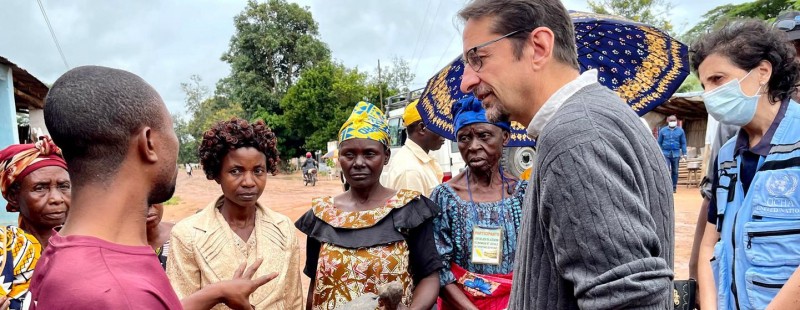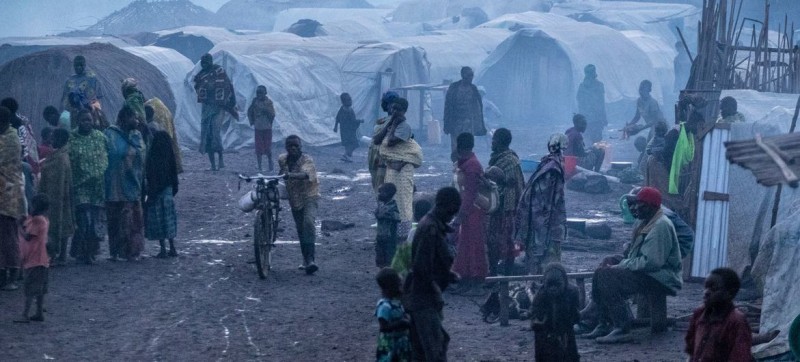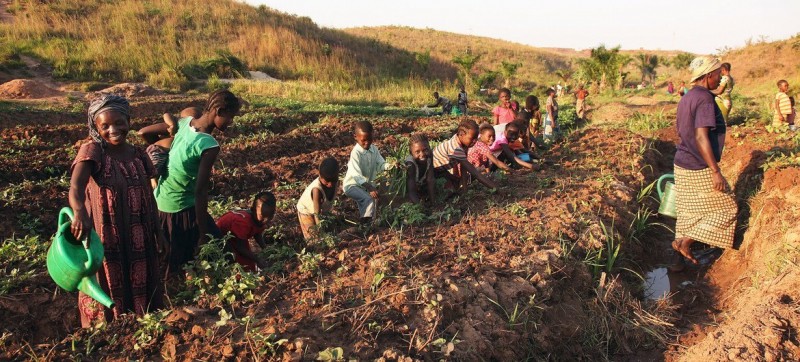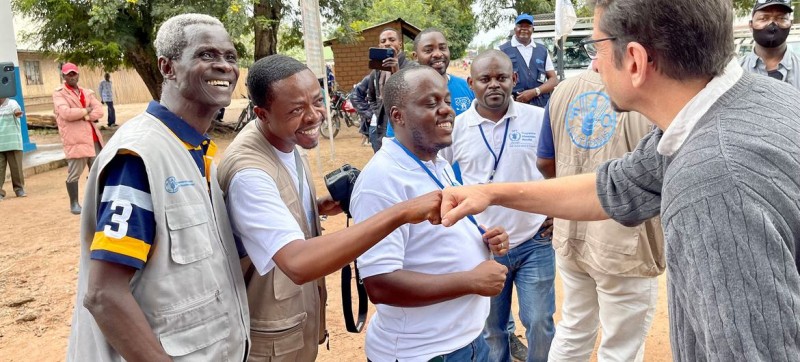UN Resident and Humanitarian Coordinator Bruno Lemarquis visits DR Congo in early March 2022. Over the last 10 years, the number of people around the world who have been forced to flee their homes and become displaced in their own countries, has more than doubled. In the Democratic Republic of Congo (DRC), the increase in internally displaced persons (IDPs) has been particularly stark, as Resident Coordinator Bruno Lemarquis, the senior UN official there, explains. “The Democratic Republic of Congo (DRC) has the largest population of internally displaced people on the African continent: 5.9 million people, including 700,000 newly displaced people this year. The DRC is also hosting over 500,000 refugees and asylum-seekers (mainly from Burundi, the Central African Republic, and South Sudan). The factors driving internal displacement are often complex and interconnected, from conflicts, climate related shocks, disasters, to rising rates of violent crime. In the DRC, the protracted conflicts in the Eastern Provinces of Ituri, North Kivu and South Kivu, as well as renewed tensions in the central southern regions of Kasai and Tanganyika, have been the key source of displacement in the country, forcing millions of people to leave their homes, often on multiple different occasions. As the inter-communal conflicts in the Eastern Provinces roll into their second decade, and tensions and violence over the use of land and exploitation of natural resources continue, including through the many armed groups active in these regions, more displaced families are forced to depend on humanitarian assistance in order to survive. Internally displaced persons (IDPs) at Loda IDP camp in Fataki, Ituri Province, Democratic Republic of the Congo. As we know, humanitarian assistance – although necessary to alleviate suffering in the short term – is not enough to solve the deep-rooted, structural challenges driving internal displacement. Finding coherence and redressing the balance between humanitarian, peacebuilding and development action is critical, and is the first of many steps necessary to build longer lasting solutions to internal displacement and meet the needs of the millions of people stranded in IDP sites. Over the past few years, we – the UN country team in the DRC as well as the Humanitarian Country team – have been working closely with the Government of the DRC and provincial authorities, along with other development, humanitarian, and peacebuilding partners, to implement the humanitarian-development-peace nexus. By working in coordination with national and international partners, this nexus-based strategy moves away from the project centric approach to tackle the key structural causes of internal displacement – what I have come to refer to as the ‘Gordian knots.’ Building on my recent experience in Haiti as the Resident and Humanitarian Coordinator and Deputy Special Representative of the Secretary-General, I’ve also come to recognize the importance of working with national authorities to scale up and implement existing public policies in order boost the country’s development trajectory. Women and children displaced by violence working in their vegetable garden in Kalemie, Tanganyika where FAO provides seeds and tools so that displaced families and the local population can grow vegetables. At the center of this approach is the recognition that after 20 years of reliance on the humanitarian community and the presence of UN’s peacekeeping forces (MONUSCO), which play an essential role in protecting civilians, we need to open up more space to development actors in the DRC – and work in a more balanced way to address both the symptoms and drivers of displacement. Even during the current period of crisis and escalating violence, I’ve come to see just how important it is to plant the seeds of development and address the underlying vulnerabilities which have uprooted so many families across the country in the first place. During several visits to Tanganyika province, which has high levels of IDPs, I was struck by just how many different factors – both the symptoms and drivers of displacement – are at play, including high levels of food insecurity, the difficulty to access services, competition over the region’s wealth of natural resources, and escalating violence against civilians. ] I spoke with many IDPs during these visits to Tanganyika province, each of them sharing their own story of displacement and explaining the tough conditions they currently live under. Here are some of the things they told me. ‘The thing we want most in the world is to return home, to cultivate our land, but the security conditions are not there yet – and so we have to continue to live in these difficult conditions.’ ‘We want peace to return because only lasting peace can allow us to return to our villages.’ Finding a lasting solution to forced displacement in this part of the country clearly requires the involvement of many different actors – peacebuilders, humanitarians, development partners and local government – all working together towards one common game plan and collective outcomes. Development can have an important multiplier effect, helping to strengthen local actors and systems, boost local economic development and support a return of State authority. Working with local organizations, including NGOs and civil society organizations is key. We must continue to walk the talk on localization In eastern DRC, a region which has over relied on humanitarian actors for the provision of social services and public infrastructure in the past, empowering local state actors is a key step to building more sustainable solutions to displacement, and one which we at the UN country team will continue to prioritize in the years ahead. During a visit to Tanganyika in March 2022, the Resident and Humanitarian Coordinator meets colleagues from FAO and WFP who are providing support to internally displaced people living in the site. The UN Secretary-General’s Action Agenda on Internal Displacement, marks an important step in this direction. Building on the recommendations from the High-Level Panel on Internal Displacement at the end of 2019, the Action Agenda sets out a series of commitments for the UN system to step up its engagement and build longer lasting solutions to internal displacement, by placing prevention, protection and local partnerships at the centre. The challenges ahead for the DRC are significant, but I am hopeful that the new Action Agenda, alongside the nexus-based approach, will ensure that displaced communities are further protected, local authorities strengthened, and development actors brought to scale”.

Untying the ‘Gordian knots’
The need to find durable and long-lasting solutions to the issue of internal displacement in the DRC could not be more urgent. 
Planting the seeds of development

A hopeful road ahead
The UN Resident Coordinator
Learn more about the work of the UN in the Democratic Republic of Congo here.
Related Posts
WEJ PROJECTS
© 2009-2025, World Economic Journal. All Rights Reserved. Republishing permitted with attribution and active hyperlink to the original source.

